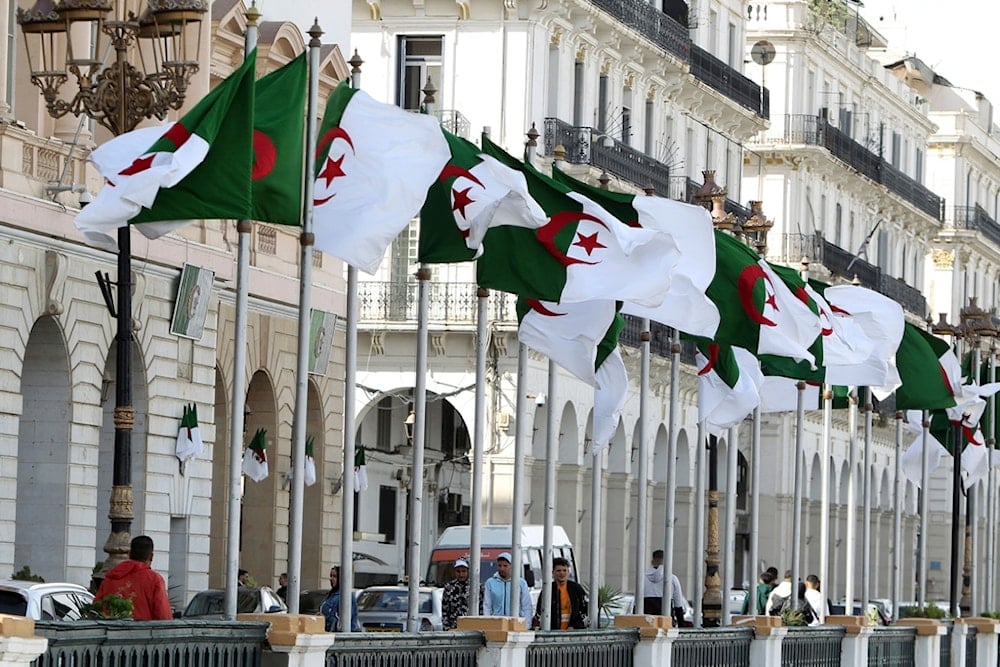Algeria slams Macron over visa deal suspension, blames France
Algeria has forcefully rejected French President Emmanuel Macron's suspension of a 2013 visa agreement, accusing France of distorting facts, violating bilateral treaties, and escalating tensions through unilateral actions and diplomatic pressure.
-

Algeria's flags fly Wednesday, April 16, 2025 in Algiers. (AP Photo/Fateh Guidoum, File)
The Algerian Ministry of Foreign Affairs issued a strongly worded response on Thursday to French President Emmanuel Macron’s recent directive to suspend the 2013 visa exemption agreement for diplomatic and service passport holders, accusing Paris of distorting facts, violating treaties, and provoking the current diplomatic crisis.
"The letter exonerates France entirely of its responsibilities and places all blame on the Algerian side. Nothing could be further from the truth or reality," the ministry stated. The letter in question was addressed by Macron to his Prime Minister and followed by further explanations delivered to the Chargé d’Affaires at Algeria’s embassy in Paris on August 7.
Algeria’s response rejected the French narrative, arguing that the "current crisis has regularly been the subject of official statements from the Algerian Ministry of Foreign Affairs" and that its actions have "strictly and rigorously" adhered to the principle of reciprocity. It accused France of approaching the relationship through "injunctions, ultimatums, and summonses," insisting that "Algeria does not yield to pressure, threats, or blackmail in any form."
Visa agreement denounced
The statement clarified that Algeria had never requested the 2013 bilateral visa exemption agreement, asserting that it was "France, and France alone" that pushed for the deal. "By deciding to suspend this agreement, France offers Algeria the perfect opportunity to announce its outright denunciation," the ministry declared, adding that the Algerian government would formally notify France of this decision through diplomatic channels in line with Article 8 of the agreement.
Algeria further announced that it would now impose the same visa restrictions on French diplomatic passport holders as France does on Algerians, a significant symbolic and procedural shift.
The 2013 accord had allowed holders of diplomatic and official passports from both countries to travel without a visa. The event marks the most visible rupture in Franco-Algerian relations since Macron assumed office, and adds to a string of recent political and legal disputes.
Sovereignty standoff
Macron’s move comes amid rising political friction following the sentencing of French-Algerian author Boualem Sansal and French journalist Christophe Gleizes in Algeria. Sansal was given five years for "undermining national unity," while Gleizes received seven years for allegedly "glorifying terrorism." These cases were directly cited by Macron in justifying the tougher stance and visa policy reversal.
The Algerian Foreign Ministry, however, accused France of using these legal cases as a pretext to undermine Algerian sovereignty and impose pressure tactics. "France has acted through injunctions, ultimatums, and summonses. This reveals a profound misjudgment, as Algeria does not yield to pressure, threats, or blackmail in any form," the ministry declared.
Human rights violations
Elsewhere in the statement, Algeria accused France of violating multiple bilateral and international agreements, including:
- The 1968 Algerian-French Agreement on the movement and residence of Algerians in France
- The 1974 Consular Convention
- The 2013 diplomatic visa exemption agreement
- The 1950 European Convention on Human Rights
The ministry stated that France had "focused solely" on the 1994 readmission agreement, distorting its purpose to justify the arbitrary expulsion of Algerian nationals and undermining Algeria’s duty to protect its citizens abroad.
Algeria promised "unwavering" consular protection for its nationals in France, asserting it would help them secure their rights and challenge what it described as abuses of French and European law.
Diplomatic staffing dispute
The statement also addressed an ongoing conflict over diplomatic and consular accreditations, revealing that France had for more than two years refused to approve the postings of at least eight Algerian diplomats, including three consuls general. Algeria stated it was merely applying the principle of reciprocity and would resume accreditation once French obstacles were lifted.
Read more: Algeria retaliates, bars French diplomats from port, airport access
In closing, Algeria indicated it would use diplomatic channels to raise its own list of unresolved disputes with France, in response to Macron’s call for settling bilateral tensions.
As both governments signal readiness to escalate rather than reconcile, the future of cooperation on key issues, from consular affairs to regional security, now hangs in the balance.

 4 Min Read
4 Min Read








